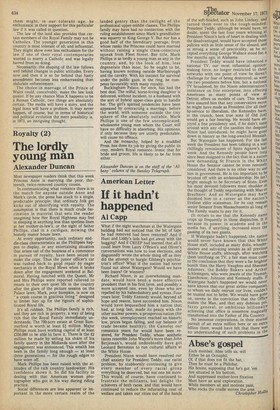Royalty (2)
The lordly young man
Alexander Duncan
Most newspaper readers think that this week. Princess Anne is marrying the poor, thirteenth, twice-removed country. cousin.
In communicating what romance there is in the match for anyone outside Anne and Mark's circle, the press has stuck to a single, predictable principle: that ordinary folk get kicks out of identifying with royalty. The assumption is that there is much crude fascination in material that sets the reader imagining how Her Royal Highness may feel in sleeping in anything less than spotless linen at her mother-in-law's, or the sight of father Phillips, clad in a cardigan, mowing the homely manor house lawn.
At every opportunity, such ordinary middle-class characteristics as the Phillipses happen to display, or any entertaining situation that arises out of the business of a commoner in pursuit of royalty, have been seized to make the copy. Thus the junior officer's car was rushed back to goqd repair by eager mechanics in the Royal Mews when it broke down after the engagement weekend at Balmoral. Having lunched with the Queen, Mr and Mrs Phillips were reported relieved to return to their own quiet life in the country after the glare of the picture session on the Palace lawn; Mark, poor bumpkin, is now on "a crash course in gracious living" designed to limber him up for the rigours of sophisticated Royal life.
It's all rubbish. The Phillips family is rich, and they are rich in property, a way of being rich that the Royal Family immediately understands. The 700-acre estate at Great Summerford is worth at least £i million. Major Phillips must have working capital of at least £350,000 to be able to farm it. There is the £2 million he made by selling his share of his family quarry in the Midlands soon after the engagement was announced. This wealth has been in the family long enough — at least three generations — for the rough edges to have worn off.
Mark Phillips has been raised with the attitudes of the rich country landowner. His confidence shows it. So did his facility in dealing with that American woman photographer who got in his way during riding practice.
Social differences are less apparent or important in the more certain realm of the landed gentry than the twilight of the professional upper-middle classes. The Phillips family may have had no connection with the ruling establishment since Mark's grandfather was equerry to King George V. But nor has a good half of the hereditary peerage, from whose ranks the Princess could have married without raising a single class-conscious squeak from Fleet Street. Bar title, Mark Phillips is as lordly a young man as any in the country, and, by the look of him, less degenerate than most. So he ought to be, having known nothing outside Marlborough and the cavalry. With his instinct for survival under the public gaze, in the ring, he competes favourably with many royalty.
Buckingham Palace, for once, has had the best deal. The wilful, horse-loving daughter is delivered, without incident, to a husband with the sort of hybrid upper-class guts to handle her. The girl's spirited tendencies have been appeased by contracting a marriage, before the world, with someone outside the tiny sphere of the absolutely suitable. Mark Phillips is one of the few uncomplicated, wholesome young men whom the Court will have no difficulty in absorbing. His opinions, if only because they are utterly predictable, will cause no offence.
And the monarchy, helped by a muddled Press, has done its job by giving the public its cosy, modern Royal romance. Ironic that for bride and groom, life is likely to be far from either.
Alexander Duncan is on the staff of the 'Albany' column of the Sunday Telegraph.


































 Previous page
Previous page